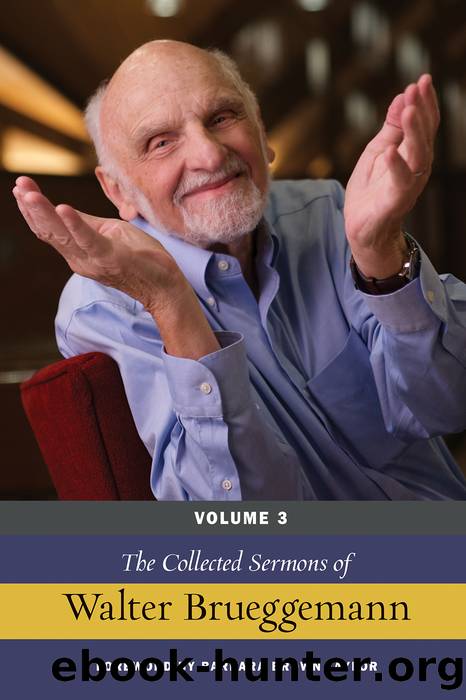The Collected Sermons of Walter Brueggemann, Volume 3 by Walter Brueggemann

Author:Walter Brueggemann
Language: eng
Format: epub
ISBN: 9781611649765
Publisher: Presbyterian Publishing Corporation
III.
And then I thought these are two alternative ways to live:
Good things come to those who wait;
Good things come to those who take.
The one way has a gift-giving God at the center. The other places oneâs self at the center of life, because if we do not take, we will not have. The one imagines enough gifts for all; the other imagines scarcity, not enough to go around, so that one must take while we can. It occurred to me that this obscure text from Paul to the church at Corinth makes a nice contrast between taking and waiting. The urging of Pastor Paul to his church is that those who know the gospel know that they cannot order their lives as takers, because the gospel is about receiving gifts from God that are free, but are given in Godâs way in Godâs time.
So here are four contrasts that Paul voices that we may continue to think about:
1. Paul contrasts outer nature with inner nature:
So we do not lose heart. Even though our outer nature is wasting away, our inner nature is being renewed day by day. (2 Cor. 4:16)
By outer nature Paul means the social self, the visible appearance of the self, social appearance, so look good, look successful, look competent. But the inner nature is the true self that is known to God, the self that is valued by God, no matter the appearance. Paul warns his parishioners not to bet on the outer self of certitude or wealth or influence, because it is wasting away. The body will fail, the money will erode, the trouble will come. But the inner self loved by God, renewed by God, will flourish as the outer self fails.
2. Paul contrasts what is seen and what is not seen:
We look not at what can be seen but at what cannot be seen. (v. 18a)
Be seen, so we diet and exercise and get cosmetic surgery and dress better and exhibit wealth and success, right car, right house, and in our ad-driven society are preoccupied with how we look, or how our kids impress. But the unseen self is not on exhibit, so we cannot fake it or cover up the true self. Paul says, do not use your energy on being a seen self, but pay close attention to the hidden self who lives in the presence of God.
3. Paul contrasts the temporary with the eternal:
What can be seen is temporary, but what cannot be seen is eternal. (v. 18b)
Paul has in mind that the visible, socially valued self is unsustainable and cannot last. Cannot last because of fragile health, disability, finally death. Cannot last because of all kinds of unanticipated reversals, of market failures, of diseases that kill indiscriminately, of drought or earthquake or random threat or accident. Cannot last!
By âeternalâ maybe Paul means life after death. More likely he means to set the true self in Godâs presence that is not defined by worldly measure, the core of self that is beloved by God and sealed as Christâs own forever.
Download
This site does not store any files on its server. We only index and link to content provided by other sites. Please contact the content providers to delete copyright contents if any and email us, we'll remove relevant links or contents immediately.
| Adult Ministry | Children's Ministry |
| Counseling & Recovery | Discipleship |
| Evangelism | Missions & Missionary Work |
| Preaching | Sermons |
| Youth Ministry |
Victory over the Darkness by Neil T. Anderson(2862)
The Rape Of Nanking by Iris Chang(2813)
Chosen by God by R. C. Sproul(2161)
Habits of Grace by David Mathis(1976)
Crash the Chatterbox by Steven Furtick(1974)
Knowing God by J.I. Packer(1854)
How To Be Born Again by Billy Graham(1778)
A Prophet with Honor by William C. Martin(1717)
Gospel-Shaped Marriage by Chad van Dixhoorn(1716)
Peace with God by Billy Graham(1683)
Confronting Christianity by Rebecca McLaughlin(1589)
God's Smuggler by Brother Andrew(1542)
Angel Dreams by Virtue Doreen Virtue Melissa(1475)
Whisper by Mark Batterson(1452)
The School of Biblical Evangelism by Ray Comfort(1437)
Missionaries by Norman Lewis(1427)
The Truth War by John MacArthur(1423)
The Poems of Rowan Williams by Rowan Williams(1354)
Do Greater Things by Robby Dawkins(1324)
